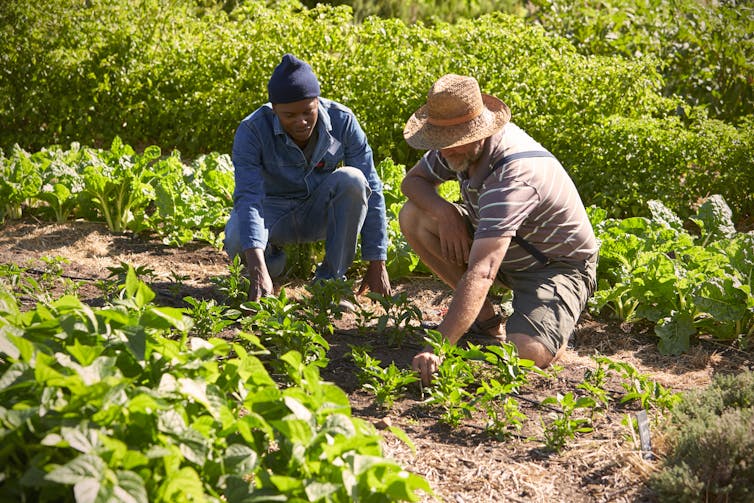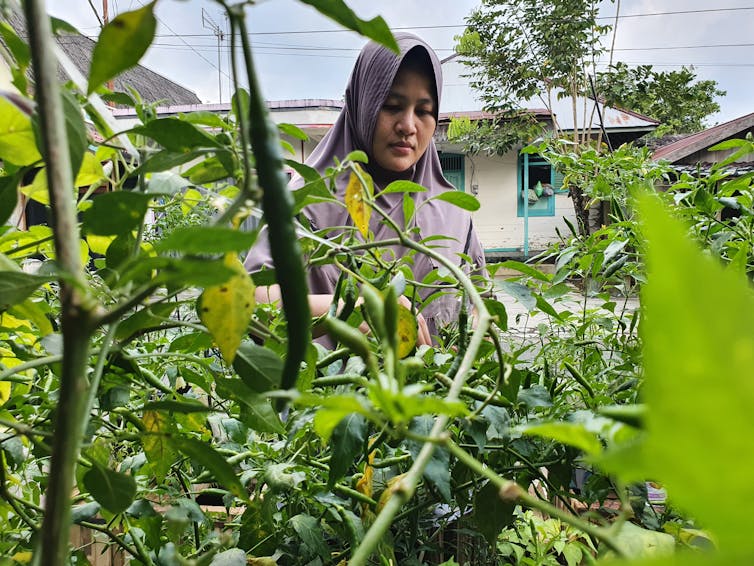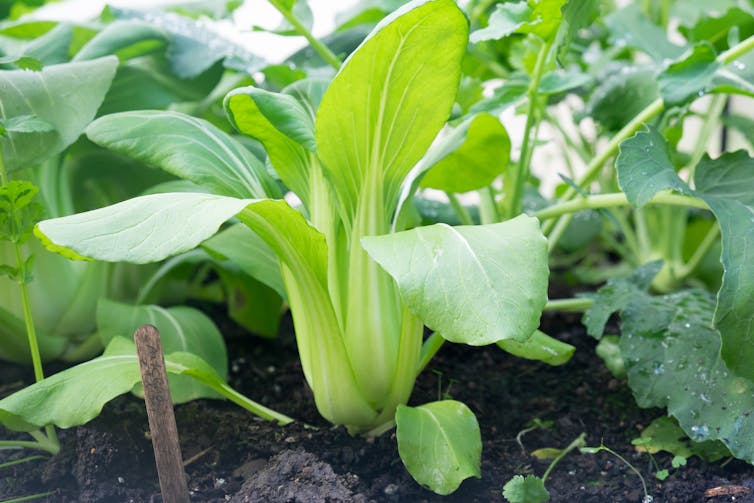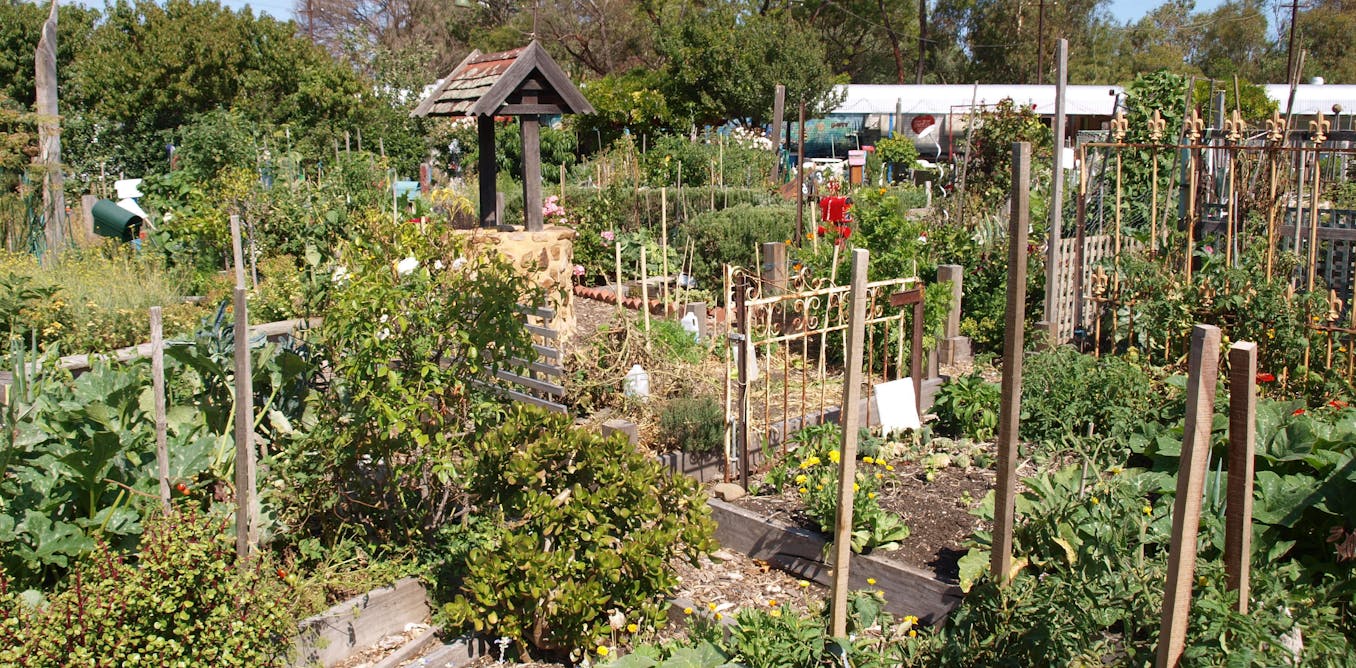[ad_1]
With tons of of 1000’s of Australians enduring lockdown however as soon as extra, you may be trying to find solace in gardening. For migrants and refugees in Australia, gardening could also be notably vital when shared in group areas.
Nevertheless group gardens aren’t always web sites of inclusion. In our not too way back printed evaluation, my colleagues and I highlight the strategies migrants and refugees are excluded from group gardens — and learn the way to vary this.
When group gardens are socially inclusive, everyone benefits. Culturally varied group gardens cannot solely deepen cross-cultural social connections, they may even help develop the skills to adapt to range and catastrophe, akin to from native climate change.
The benefits of group gardens
Prepared lists to affix group gardens are terribly prolonged in numerous elements of Australia, with some gardens requiring as a lot as an eight-year wait. Advocacy groups persistently identify for further web sites and better financial help to fulfill this demand.
There are good causes for his or her rising repute. Improved psychological and bodily effectively being and wellbeing typically tops the report of their optimistic impacts, as they promote further prepare, larger entry to nutritious meals, strengthen group connections, and further.
Be taught further:
Inexperienced for wellbeing – science tells us learn the way to design metropolis areas that heal us
The meals grown in group gardens can also help improve meals security. All through lockdown, these web sites have been essential to fulfill the frequently desires of many affected by financial hardship.
For refugees and migrants, communal gardening web sites could also be therapeutic, protected areas.
When immersed in supportive communities that share a dedication to productive gardening, migrants and refugees can improve their self-efficacy. The facility to develop culturally acquainted meals can also preserve their connections to homelands, easing the resettlement and migration course of.

Communal gardens must be protected areas.
Because of this it’s so important to boost these options and take away any limitations excluding these gardeners. Our evaluation reviewed worldwide analysis of group gardens, and situated frequent limitations to refugee and migrant participation revolve spherical three key areas:
1. Bodily and supplies choices of gardens
This consists of extreme membership expenses, incapability to easily journey to gardens and insecure land tenure.
Web site design that limits gardeners’ autonomy and talent to develop acquainted meals may also be a problem. This can happen the place there’s communal, considerably than specific particular person, plot cultivation, putting pressure on new gardeners to develop meals already well-known to present gardeners.
One different barrier is a shortage of obtainable space and small plot sizes, which could make it extra sturdy to develop culturally important crops, akin to maize.
2. Yard administration varieties
Inclusive practices are generally not embedded into data sharing and selection making, akin to not translating data.
For example, group gardens usually rely on formal administration conferences, nevertheless these couldn’t take into accounts fully completely different languages, cultural traditions and unequal vitality relations.
Relying on group gardens for meals security could be a big draw back for refugees and migrants, significantly for model new arrivals. This can end in gardens altering further holistic social help functions.
Be taught further:
Understanding of points to do in isolation? Get once more throughout the yard with these ideas from 4 consultants
3. Privileging particular values and aesthetics
The way in which wherein we glance after gardens and ideas about how a productive yard must look, are generally shaped by regardless of cultural norm is dominant. Uniform, neatly mulched raised beds, free of weeds and overhanging vegetation, are generally favoured by menace averse councils.
Migrant and refugee gardening varieties could also be at odds with accepted expectations and values like these. Many are used to cultivating immediately into the soil and wish to develop all types of crops collectively that won’t look neat, nevertheless can enhance biodiversity. They may moreover go away further house between crops to boost yield.
This suggests these acquainted, productive and culturally relevant strategies of gardening for refugees and migrants could also be devalued and excluded, along with their skills and knowledge.

Volunteer groups managing group gardens must be give further property.
The good news is we’ll make group gardens further socially inclusive areas. To try this, there should be further funding from governments and native councils in property (along with land and financial help) for the largely volunteer groups rising and managing these web sites.
These property need to assist migrants and refugees to:
- develop social and ecological connections that engender a method of belonging
- contribute to the design and administration of gardens in culturally and linguistically inclusive strategies
- make choices about learn the way to tend their plots that enable some connection to their homeland
- engage with completely different yard members from all backgrounds to share knowledge and courses
- not should rely on the yard as a most important provide of meals or earnings expertise.
Gardens are larger when migrants and refugees are included
Neighborhood gardens are at current off limits to many beneath lockdown. After we return to COVID-normal, the teachings from socially inclusive gardens might help communities larger put collectively for future disruption, notably from native climate change.
Be taught further:
From veggie gardening to op-shopping, migrants are the quiet environmentalists
Resettlement in a definite nation consists of ongoing modifications to new social, ecological and native climate conditions. We’re capable of all research from migrant and refugee skills, knowledge, and the strategies they adapt, as adjustment to unfamiliar environments usually comes with cautious tinkering and trial and error.
As regards to meals gardens, earlier evaluation has confirmed this experimentation can lead to boosting biodiversity and rising diets, on account of variety of crops grown. One occasion is the introduction of maize to provide maize flour in numerous gardens all by means of Australia. It’s a weight reduction plan staple for lots of African nations.

The necessity to develop meals from the homeland can lead to gardening strategies which will keep future changes in native climate.
The necessity to develop culturally associated meals means tinkering with soil and rising conditions, along with the crops themselves. This allows the crops to adapt to unfamiliar conditions, which may become increasingly variable beneath native climate change. Finding out learn the way to develop tropical crops in frosty elements of Victoria or on marginal soils are a couple of good examples.
What’s further, gardeners from varied backgrounds can enhance a gaggle’s repertoire of protected, low-tech cultivation and pest administration strategies. This consists of learn the way to profit from the waste from culturally acquainted meals, akin to Japanese gardeners’ use of tofu residue as a soil conditioner.
Not solely will bringing collectively culturally varied group members foster further vital connections, however moreover it ought to strengthen our shared means to adapt to the uncertainty of a altering native climate.
The creator need to acknowledge Jessica Abramovic and Cathy Hope who helped compile the evaluation upon which this textual content relies.
[ad_2]
